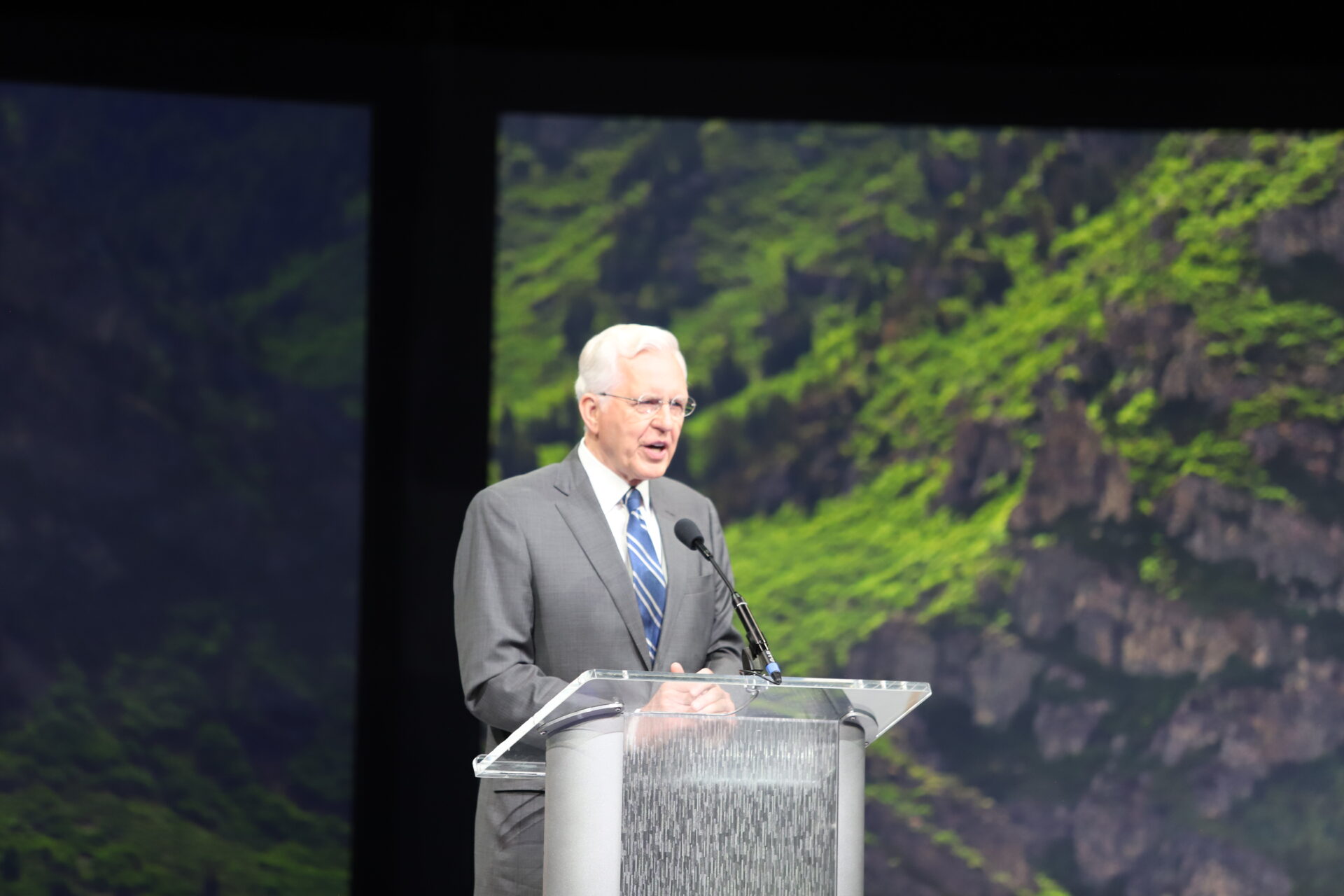
Elder D. Todd Christofferson of the Quorum of the Twelve Apostles of The Church of Jesus Christ of Latter-day Saints and President Kevin J Worthen addressed all university personnel, full and part-time faculty, retirees and surviving spouses for the first day of BYU’s annual University Conference on Aug. 22.
President Worthen began the opening general session at the Marriott Center by recognizing remarkable individuals, professors and staff at the university who stood out during the past academic year.
Among those awarded were mechanical engineer professor Brent W. Webb with the Karl G. Maeser Distinguished Faculty Lecturer Award, Branden R. Wilson with the Ben E. Lewis Management Award which recognizes an administrative employee for outstanding management abilities, and mathematics professor Lonette Stoddard with the Fred A. Schwendiman Performance Award.
President Worthen then proceeded to name some of the university’s accomplishments for the 2021-2022 academic year such as students earning numerous prestigious scholarships, BYU Athletics winning national championships and BYU Grounds and the landscape management program winning the National Collegiate Landscape Title.
He then announced that the Northwest Commission on Colleges and Universities officially renewed BYU’s institutional accreditation for another seven years.
President Worthen continued his address by discussing BYU’s updated strategic plan and its new brand messaging statement.
“Our main strategic objectives remain to ‘(1) ensure alignment with the university mission, (2) enhance the education experience of students and (3) enlarge the influence of a BYU education,'” he said. “The two biggest differences in this updated plan are the inclusion of specific action items for many of the priorities and a decidedly second-century-address tone.”
He explained how students are now a more prominent part of the updated plan, anyhow there is an express recognition that “all employees, faculty, staff, and administrative are critically involved in sharing students in the way described in the mission statement.”
President Worthen also emphasized how one of BYU’s goals is to “promote a sense of belonging among all members of the campus community,” and that to accomplish so, the Office of Belonging would have to take the lead in planning and directing the work.
“This will help us avoid the divisive and polarizing forces generated by some approaches to this important issue so that we can have a truly unified, and unifying, gospel-based belonging effort that will have long-lasting effect,” he said.
Elder Christofferson proceeded to talk to those at the Marriott Center, by acknowledging how students, faculty and staff are privileged to attend a university with an environment of rich and spiritual, intellectual and character-building opportunities and associations.
“My hope, however, is that each students and each of us will have the humility to recognize that ‘it is not all just for me’ or that ‘it is now all about me,’ rather it is about what I can be empowered to do for the good of others,” he said.
Elder Christofferson explained how he believes three things are needed for a BYU education to serve as the means to the higher end of life in the service of God and His children.
The first one is to cultivate a love of God and fellowman, since according to Elder Christofferson, people grow to love what and who they serve.
“We often focus or love of fellowman within the Church, what the scriptures call the household of faith,” he said. “I urge that we consider an added focus on civic charity, that is, cultivating a greater measure of this Christ-like love for those outside the household of faith. I believe we can be more intentional in making this the primary motivation for all we do in the community and in the world s well as the Church.”
The second requisite he names was to realize that the higher end for which a BYU education provides the crucial means is to stay focused on one’s priority identities.
“The temptation to apply hateful labels is almost overwhelming, but if our eye is fixed on our paramount identities, however, we can resist that temptation, we can even learn to love our enemies even as we oppose them,” he said. “Our service for the betterment of individuals and societies can obtain truly significant results only as we remember first and foremost who and what we are.”
The last requirement Elder Christofferson named was to apply the means represented by “The Aims of a BYU Education” by promoting and possessing the virtue of forgiveness.
“If we are able to serve, and to join with others in service, there must at least be the possibility of progress, the possibility of moving beyond the past, the possibility of collaboration, the possibility of forgiving one another and moving on,” he said. “I am not suggesting that wrongs be ignored, but I am suggesting that as they are addressed, they should not be allowed to separate and stymie us in perpetuity.”
Elder Christofferson concluded his address by emphasizing the need for service and teaching service to BYU students.
“Service is a sanctifying experience. We need to be served,” he said. “Please help students understand that the ‘Aims of a BYU Education’ are really the means that qualify and prepare them to achieve the end of shared service in the cause of Christ, the redemption of mankind.”




